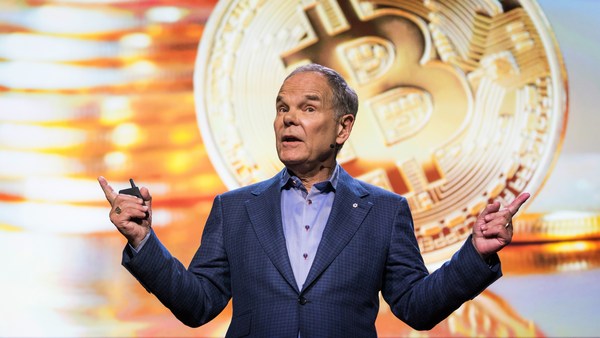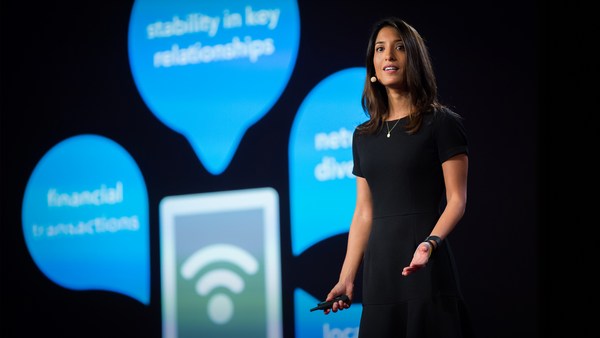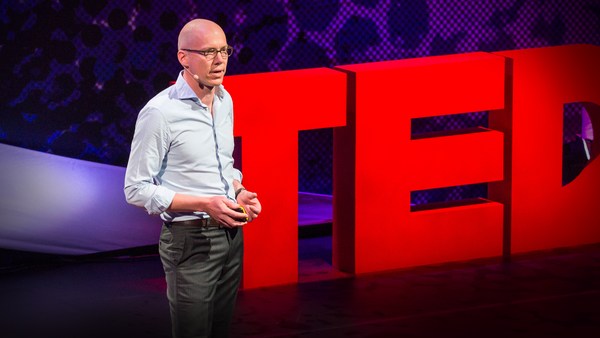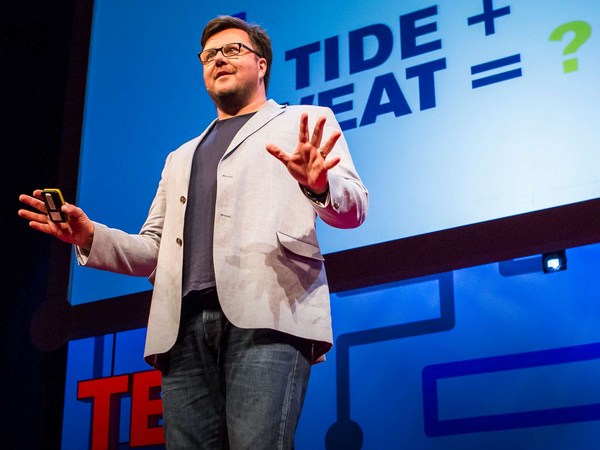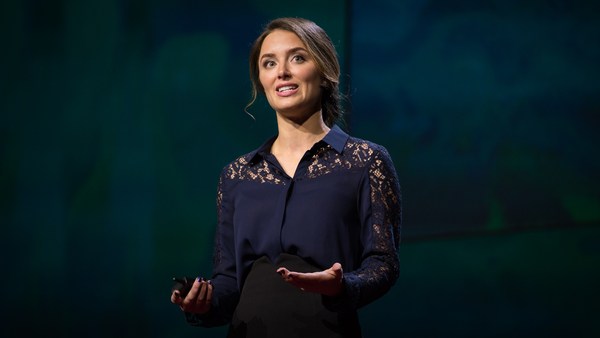I want to tell you about the future of money. Let's start with a story about this culture that lived in Micronesia in the early 1900s, called the Yap. Now, I want to tell you about the Yap because their form of money is really interesting. They use these limestone discs called Rai stones. Now, the Yap don't actually move these Rai stones around or exchange them the way we do with our coins, because Rai stones can get to be pretty massive. The largest is about four tons and 12 feet across. So the Yap just keep track of who owns part of what stone.
There's a story about these sailors that were transporting a stone across the ocean when they ran into some trouble and the stone actually fell in. The sailors got back to the main island and they told everyone what had happened. And everyone decided that, actually, yes, the sailors had the stone and -- why not? -- it still counted. Even though it was at the bottom of the ocean, it was still part of the Yap economy.
You might think that this was just a small culture a hundred years ago. But things like this happen in the Western world as well, and the Yap actually still use a form of these stones.
In 1932, the Bank of France asked the United States to convert their holdings from dollars into gold. But it was too inconvenient to think about actually shipping all of that gold over to Europe. So instead, someone went to where that gold was being stored and they just labeled it as belonging to France now. And everyone agreed that France owned the gold. It's just like those Rai stones.
The point I want to make with these two examples is that there's nothing inherently valuable about a dollar or a stone or a coin. The only reason these things have any value is because we've all decided they should. And because we've decided that, they do. Money is about the exchanges and the transactions that we have with each other. Money isn't anything objective. It's about a collective story that we tell each other about value. A collective fiction. And that's a really powerful concept.
In the past two decades, we've begun to use digital money. So I get paid via direct deposit, I pay my rent via bank transfer, I pay my taxes online. And every month, a small amount of money is deducted from my paycheck and invested in mutual funds in my retirement account. All of these interactions are literally just changing 1's and 0's on computers. There's not even anything physical, like a stone or a coin. Digital money makes it so that I can pay someone around the world in seconds.
Now when this works, it's because there are large institutions underwriting every 1 or 0 that changes on a computer. And when it doesn't, it's often the fault of those large institutions. Or at least, it's up to them to fix the problem. And a lot of times, they don't. There's a lot of friction in the system. How long did it take the US credit card companies to implement chip and pin? Half my credit cards still don't work in Europe. That's friction. Transferring money across borders and across currencies is really expensive: friction. An entrepreneur in India can set up an online business in minutes, but it's hard for her to get loans and to get paid: friction. Our access to digital money and our ability to freely transact is being held captive by these gatekeepers. And there's a lot of impediments in the system slowing things down.
That's because digital money isn't really mine, it's entries in databases that belong to my bank, my credit card company or my investment firm. And these companies have the right to say "no." If I'm a PayPal merchant and PayPal wrongly flags me for fraud, that's it. My account gets frozen, and I can't get paid.
These institutions are standing in the way of innovation. How many of you use Facebook photos, Google Photos, Instagram? My photos are everywhere. They are on my phone, they're on my laptop, they're on my old phone, they're in Dropbox. They're on all these different websites and services. And most of these services don't work together. They don't inter-operate. And as a result, my photo library is a mess.
The same thing happens when institutions control the money supply. A lot of these services don't inter-operate, and as a result, this blocks what we can do with payment. And it makes transaction costs go up. So far, we've been through two phases of money. In an analog world, we had to deal with these physical objects, and money moved at a certain speed -- the speed of humans. In a digital world, money can reach much farther and is much faster, but we're at the mercy of these gatekeeper institutions. Money only moves at the speed of banks.
We're about to enter a new phase of money. The future of money is programmable. When we combine software and currency, money becomes more than just a static unit of value, and we don't have to rely on institutions for security. In a programmable world, we remove humans and institutions from the loop. And when this happens, we won't even feel like we're transacting anymore. Money will be directed by software, and it will just safely and securely flow.
Cryptocurrencies are the first step of this evolution. Cryptocurrencies are digital money that isn't run by any government or bank. It's money designed to work in a world without intermediaries. Bitcoin is the most ubiquitous cryptocurrency, but there are hundreds of them. There's Ethereum, Litecoin, Stellar, Dogecoin, and those are just a few of the more popular ones. And these things are real money. The sushi restaurant down my street takes Bitcoin. I have an app on my phone that I can use to buy sashimi. But it's not just for small transactions. In March, there was a transaction that moved around 100,000 bitcoins. That's the equivalent of 40 million US dollars.
Cryptocurrencies are based on a special field of mathematics called cryptography. Cryptography is the study of how to secure communication, and it's about two really important things: masking information so it can be hidden in plain sight, and verifying a piece of information's source. Cryptography underpins so many of the systems around us. And it's so powerful that at times the US government has actually classified it as a weapon.
During World War II, breaking cryptosystems like Enigma was critical to decoding enemy transmissions and turning the tide of the war. Today, anyone with a modern web browser is running a pretty sophisticated cryptosystem. It's what we use to secure our interactions on the Internet. It's what makes it safe for us to type our passwords in and to send financial information to websites. So what the banks used to give us -- trustworthy digital money transfer -- we can now get with a clever application of cryptography. And this means that we don't have to rely on the banks anymore to secure our transactions. We can do it ourselves.
Bitcoin is based on the very same idea that the Yap used, this collective global knowledge of transfers. In Bitcoin, I spend by transferring Bitcoin, and I get paid when someone transfers Bitcoin to me.
Imagine that we had this magic paper. So the way that this paper works is I can give you a sheet of it and if you write something on it, it will magically appear on my piece as well. Let's say we just give everyone this paper and everyone writes down the transfers that they're doing in the Bitcoin system. All of these transfers get copied around to everyone else's pieces of paper. And I can look at mine and I'll have a list of all of the transfers that are happening in the entire Bitcoin economy. This is actually what's happening with the Bitcoin blockchain, which is a list of all of the transactions in Bitcoin. Except, it's not done through paper. It's done through computer code, running on thousands of networked computers around the world. All of these computers are collectively confirming who owns what Bitcoin. So the Bitcoin blockchain is core to how Bitcoin works.
But where do bitcoins actually come from? Well, the code is designed to create new Bitcoin according to a schedule. And the way that it works is that to get those Bitcoin, I have to solve a puzzle -- a random cryptographic puzzle. Imagine that we had 15 dice, and we were throwing these dice over and over again. Whenever the dice come up all sixes, we say that we win. This is very close to what these computers are all actually doing. They're trying over and over again to land on the right number. And when they do, we say that they've solved the puzzle.
The computer that solves the puzzle publishes its solution to the rest of the network and collects its reward: new bitcoins. And in the act of solving this puzzle, these computers are actually helping to secure the Bitcoin blockchain and add to the list of transactions.
There are actually people all over the world running this software, and we call them Bitcoin miners. Anyone can become a Bitcoin miner. You can go download the software right now and run it in your computer and try to collect some bitcoins. I can't say that I would recommend it, because right now, the puzzle is so hard and the network is so powerful, that if I tried to mine Bitcoin on my laptop, I probably wouldn't see any for about two million years. The miners, professional miners, use this special hardware that's designed to solve the puzzle really fast. Now, the Bitcoin network and all of this special hardware, there are estimates that the amount of energy it uses is equivalent to that of a small country. So, the first set of cryptocurrencies are a little bit slow and a little bit cumbersome. But the next generation is going to be so much better and so much faster.
Cryptocurrencies are the first step to a world with a global programmable money. And in a world with programmable money, I can pay anyone else securely without having to sign up or ask permission, or do a conversion or worry about my money getting stuck. And I can send money around the world. This is a really amazing thing. It's the idea of permission-less innovation. The Internet caused an explosion of innovation, because it was built upon an open architecture. And just like the Internet changed the way we communicate, programmable money is going to change the way we pay, allocate and decide on value.
So what kind of world does programmable money create? Imagine a world where I can rent out my healthcare data to a pharmaceutical company. They can run large-scale data analysis and provide me with a cryptographic proof that shows they're only using my data in a way that we agreed. And they can pay me for what they find out. Instead of signing up for streaming services and getting a cable bill, what if my television analyzed my watching habits and recommended well-priced content that fit within my budget that I would enjoy? Imagine an Internet without ads, because instead of paying with our attention when we view content, we just pay.
Interestingly, things like micro-payments are actually going to change the way security works in our world, because once we're better able to allocate value, people will use their money and their energies for more constructive things. If it cost a fraction of a cent to send an email, would we still have spam?
We're not at this world yet, but it's coming. Right now, it's like we're in a world that is seeing the first automobile. The first cryptocurrency, like the first car, is slow and hard to understand and hard to use. Digital money, like the horse and carriage, works pretty well, and the whole world economy is built on it. If you were the first person on your block to get a car with an internal combustion engine, your neighbors would probably think you were crazy: "Why would you want this large, clunky machine that breaks down all the time, that lights on fire, and is still slower than a horse?" But we all know how that story turns out.
We're entering a new era of programmable money. And it's very exciting, but it's also a little bit scary. Cryptocurrencies can be used for illegal transactions, just like cash is used for crime in the world today. When all of our transactions are online, what does that mean for surveillance -- who can see what we do? Who's advantaged in this new world and who isn't? Will I have to start to pay for things that I didn't have to pay for before? Will we all become slaves to algorithms and utility functions?
All new technology comes with trade-offs. The Internet brought us a lot of ways to waste time. But it also greatly increased productivity. Mobile phones are annoying because they make me feel like I have to stay connected to work all the time. But they also help me stay connected to friends and family. The new sharing economy is going to eliminate some jobs. But it's also going to create new, flexible forms of employment. With programmable money, we decouple the need for large, trusted institutions from the architecture of the network. And this pushes innovation in money out to the edges, where it belongs. Programmable money democratizes money. And because of this, things are going to change and unfold in ways that we can't even predict.
Thank you.
(Applause)
